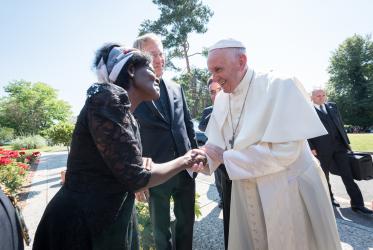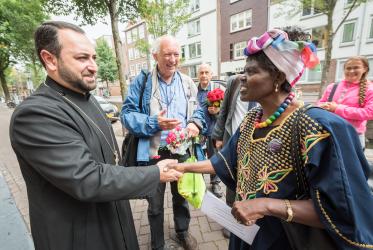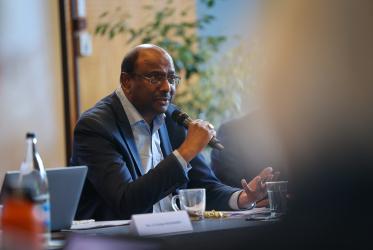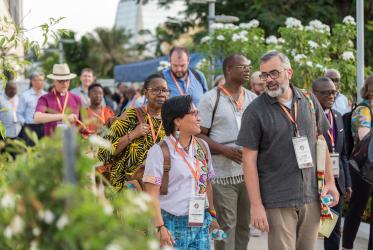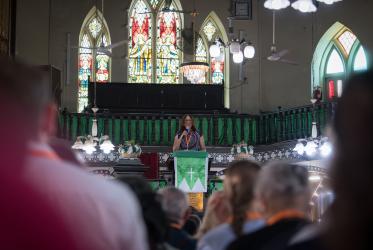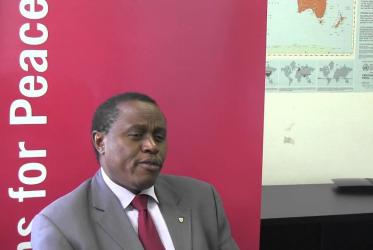Some Protestants were sceptical about the pope’s words, Brown noted, not least because of his reputation as Cardinal Joseph Ratzinger at the head of the Vatican’s Congregation for the Doctrine of the Faith, and his reaffirmation that Protestant churches were not churches “in the proper sense.”
Nevertheless, coming from Germany, Benedict XVI was the first pope from a country with a roughly equal balance between Catholics and Protestants and which was at the very centre of the 16th-century Reformation of Martin Luther, said Brown.
As Cardinal Ratzinger, he made an important contribution to the 1999 Joint Declaration on the Doctrine of Justification between Lutherans and Roman Catholics, Brown recalled.
And as Benedict XVI, he said the 500th anniversary of the Reformation in 2017 would be an opportunity for a “common ecumenical commemoration” by Lutherans and Catholics and for common prayer “for the forgiveness of mutual wrongs and for culpability relative to the divisions.”
Brown was speaking on “The Ecumenical Theology of Joseph Ratzinger,” at the Sixth Ratzinger Symposium, held at St Saviour's Dominican Priory in Dublin on 13–14 April.
The symposium was set up in 2013, following the resignation of Pope Benedict XVI from the papacy, by Fr Vincent Twomey, professor emeritus at the Pontifical University Maynooth, Ireland, and a doctoral student of Ratzinger, to explore the thought of Joseph Ratzinger/Pope Benedict XVI.
Twomey opened the symposium welcoming speakers from ten countries (United States, Canada, Mexico, Nigeria, Finland, Greece, Austria, Spain, France, and Ireland) and attendees from as far afield as Georgia, Poland, and the United Kingdom.
In his contribution at the symposium, Brown recalled that as far back as 1960, Ratzinger wrote that while Protestantism had once been rightly condemned, “Protestantism today is different from heresy in the traditional sense, a phenomenon whose true theological place has not been determined.”
For the rest of his life, said Brown, Ratzinger would be wrestling with how to determine the “true theological place” of Protestantism and other Christian churches and communities.
When in 1968, Roman Catholics were appointed for the first time as full members of the WCC Commission on Faith and Order, Ratzinger was among them and gave a keynote address to the commission meeting in 1971.
Brown noted that in the 1980s, Ratzinger wrote that while schism belongs to what is evil, when the poison of hostility is slowly extracted from the schism, “what emerges from the difference is no longer just impoverishment but a new wealth of listening and understanding.”
Christians, according to Ratzinger, needed to be “continually learning afresh from the other as other while respecting their otherness. As people who are divided we can also be one.”
Nevertheless, for Ratzinger there was an important difference between Catholics and Lutherans on the doctrine of the church. Catholics, Ratzinger said, believe the Catholic Church – the community of bishops and together with the pope – was instituted as such by the Lord.
Luther, however, saw the church, according to Ratzinger, as being based on the congregation.
Ultimate unity, wrote Ratzinger, is the gift of God, and it is necessary to “leave to God what is his business alone.”
Freed from the pressure “to do it ourselves,” Christians would approach each other more quickly and more profoundly than by transforming theology in diplomacy and faith into “action,” Ratzinger said.
The coordinator of the Dublin symposium, Dr Mary Frances McKenna, said organizers hoped “that the full breadth of Ratzinger’s theological contribution, his own unique voice, would begin to emerge from the blurred image that his leadership roles had at times given rise.”
Alongside Brown’s contribution, there were papers on “Reformation and Luther,” by Dr Emil Anton (Finland), and Joseph Ratzinger as an “Evangelical Ecumenist,” by Rev. Dr Tim Perry (Canada).
Other speakers touched on ecumenical aspects of Ratzinger’s thought, such as McKenna on important and complementary considerations by the Orthodox theologian Vladimir Lossky and Joseph Ratzinger regarding “how the theological notion of person is appropriately applied to the human being.”
Other topics addressed at the symposium included Ratzinger’s writings on eschatology and ecclesiology, the place of the “Logos” in Ratzinger’s theology, his Marian thought, his engagement with liberal democracy, and the place of the theological notion of person in his thought.
The “theologian pope” who emerged from the discussions, said McKenna, was “a scholar who laid the groundwork for ecumenical discussions, who was an important Marian scholar, who perceptively read the signs of the times, accurately reading the pulse of contemporary trends long before these became more widely apparent.“
Information about the Sixth Joseph Ratzinger Symposium
Address of Joseph Ratzinger to the Commission on Faith and Order of the World Council of Churches, Louvain, 1971, WCC Faith and Order Papers Digital Edition

